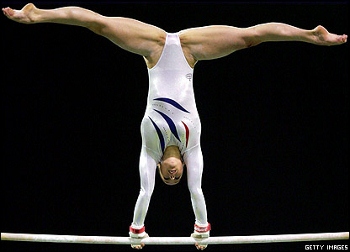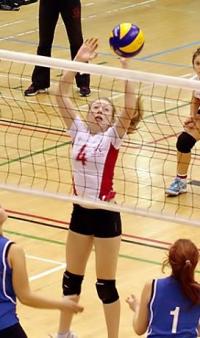Main Menu
Latest Blog Entry
User login
How can a gymnast maintain a healthy weight?
How can a gymnast train well but maintain a healthy weight with all this pressure?
Yesterday’s blog looked at incidents that happened years ago when eating disorders were not well known and the training was very different. Gymnasts’ weight were under scrutiny.
Those severe cases are hopefully less frequent with better-educated coaches and different role models.
If you watch gymnastics now, the body shapes are all different and they still get the results they need.
Take Nastia Liukin and Beth Tweddle. Both very different body shapes but both have won Olympic titles! Still, young female gymnasts don’t live in a vacuum and society itself places immense pressure on the female body image.
Gymnasts need balance…
in their diet as well as on the beam. Carbohydrates are the body’s preferred source of energy. Gymnasts will be burning huge amounts of energy so this is vital in their diets. Complex carbohydrates are needed to give the gymnast a long sustained amount of energy.
You can get these from vegetables and wholegrain/wholemeal foods. For a quicker burst of energy, simple carbohydrates from fruit and sugars can give this. But, too much of anything can be bad. Too much carbohydrate can lead to weight gain if the energy is not used afterwards. Around 60-65% of the gymnasts daily diet or 5-8g/kg/day should be enough.
Protein is vital to help recovery and support of the muscle tissues. Male gymnasts usually require more than female gymnasts. 12-15% of the daily diet or 1.2-1.7g/kg/day is needed. Sources include meats (chicken, turkey) fish, eggs and nuts.
Fats should make up the remainder, 20-35% of the total calories. Fats are another source of energy and can help transport nutrients around the body. However, the type of fat is important. Limit the amount of trans fats, these are found in processed foods. Natural fats are best and are found in nuts, meat, oily fish and olive oil.
What should a gymnast be eating before and after training?

Beth Tweddle is an example of healthy gymnast
Try and eat 1-2 hours before training. A small meal including complex carbs and fluid intake should be enough to give the gymnast a sustained level of energy throughout training.
After training, having a meal that is protein-based will help the muscles’ recovery process, and carbohydrates will replenish the energy stores.
If you have to travel, eating something like a banana or an apple within 30 minutes after training will help replenish energy stores too. This is important if there is more than one training session in the day.
Gymnasts should stay hydrated during training too. Depending on how long a training session is, an energy drink can help sustain energy or a small snack will help keep them going too (How to make your own sports drink)
During competitions, a gymnast does a lot of waiting around. It is vital that they stay hydrated throughout the day. Small and regular sips will help this. A light breakfast and regular snacks like fruit or nuts will maintain their energy levels (more on competition eating here).
If you want to see how a healthy diet looks in action, then watch this video, aimed at adults but something the whole family can do.
Conclusion
Gymnasts need to eat more than the average person because the energy expenditure is more and their bodies require more energy to help recover afterwards. Nowadays, gymnasts like Beth Tweddle are proving you don’t have to have a tiny frame to excel at the sport.
All body shapes are able to perform at the highest of standards. Supporting your body with the right foods and amounts of these foods and training hard will make a champion, regardless of body shape.
This is something we take seriously at the Excelsior ADC gymnastics club
If your club coach is obsessed with a gymnasts’ weight, then speak to the club welfare officer.
Gemma Robertson
Further reading:
Client Testimonials
 Helen Farr
Helen Farr
The access to expert advice on training and coaching in the STS has been extremely beneficial when guiding Helen (15) through different stages of her physical development. Time is very precious and especially as busy parents of even busier teenagers, we need all the help we can get. As well as following the programme, it has been really useful to dip into certain topics as and when situations occur. Advice on how to prevent and counteract knee problems was certainly helpful when Helen started complaining that ‘her knees were hurting’ directly after competitions.
More

